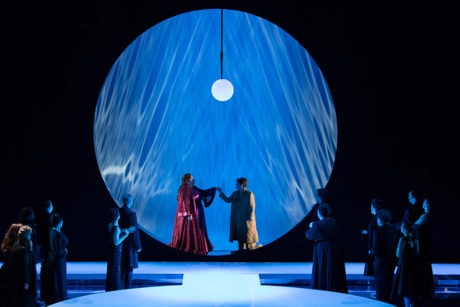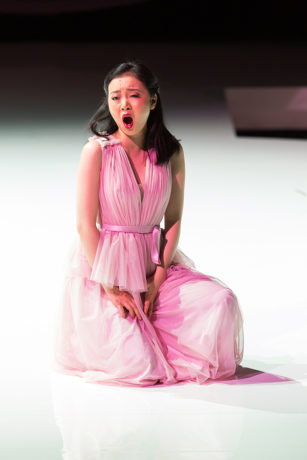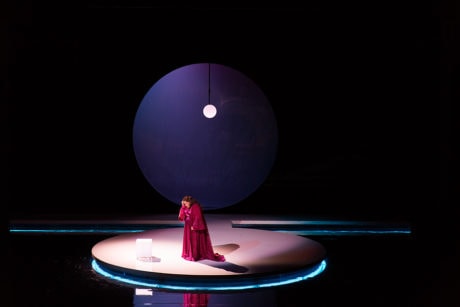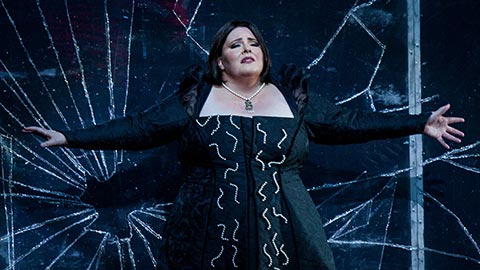The Washington National Opera is now offering opera lovers the rare treat of a disarming and whimsical baroque opera, Alcina, by Composer George Frideric Handel. An opera, by default, is often a continually accelerating variation on a theme and–indeed–Alcina (with libretto by Riccardo Broschi) is no exception. Utilizing no less than twenty-four intensive yet reflective arias–this intimately presented opera was most markedly distinctive as an extremely well-directed and executed mounting of a very specialized piece of operatic material.
Director Anne Bogart wisely keeps this production in the sure grip of her hands with a conception that encompassed top-notch and audaciously positive production and technical choices while showcasing a cast of top-flight operatic talent with differing vocal styles that played off each other beautifully.

The opera’s basis is sparked by elements of Ludovico Ariosto’s epic poem Orlando furioso. The vagaries and vicissitudes of romantic love and all its capriciousness, fatalism, folly and foibles are played out in full throttle with the themes of reality and illusion, truth and deceit, and tragedy and whimsy. The opera often reminded me of the bewildered couplings and parings of characters in Shakespeare’s comedies such as Twelfth Night and A Midsummer Night’s Dream.

Bogart employs some provocatively effective touches during the proceedings such as having the entire operatic ensemble sitting on the left and right-hand side of the stage observing the action and, several times, they were brought down to the apron of the stage to mesmerizing effect.
Lighting Designer Christopher Akerlind employs mesmerizing multi-hued pinks, magentas, and blues to create an evocative moon that captures one’s full attention at the center of the stage.
Bogart also very intriguingly incorporated the marvelous Conductor Jane Glover as an integrated member of the production by bathing her in a golden light as the cast members sang. Glover conducted with a sense of freedom yet, concurrent, control that I have rarely ever seen. Glover’s conducting of the frequent operatic orchestral passages that occurred between primary stage action and arias was just as enthralling and charismatic as the accompaniment she lent to the numerous thrilling arias prevalent throughout. A sense of light whimsy and panache pervaded throughout Glover’s conducting.
The Washington National Opera Orchestra played with utter sensitivity throughout–with the violins especially compelling. The Washington National Opera Chorus sang beautifully and the Washington National Opera Dancers contributed with entrancing lithe and delicately paced stylized movement during several interludes. (Choreographer Barney O’Hanlon is to be commended).
Set Designer Neil Patel wisely kept stage elements stripped down and spare (yet with classic lines) so the accent would fall on the glorious Handel arias as performed by the versatile operatic talents. Patel thus created a universal relevance to the opera by introducing timeless design elements to the production that were neither too contemporary or too “of the original timeframe” that the opera was written in.
Costume Designer James Schuette conveyed his sartorial experience by costuming with a discerning eye towards the universal in fashion. Mr. Schuette emphasized clean lines, classic cuts for the tailored black outfits of the lager ensemble and striking bolder magentas and ethereal pastel pinks for the female leads.
Renowned Soprano Angela Meade sings the title role with the complete professionalism and vocal control that is the mark of an operatic star with vast experience. Meade’s voice was resonant and rich singing aria after aria with the requisite vocal shading and pacing that were required for this demanding role. Especially captivating were Meade’s arias: “Ah, mio cor! Schernito sei!,” “Ombre pallide, lo so, m’udte,” “Ma quando tornerai,” and “Mi restano le lagrime.”

Ms. Meade’s arias of defiance and rage were particularly emotionally effective and showcased her vocal fluidity as she delicately transitioned from her upper to lower register with control and finesse.
Perhaps the singer who had the most expansive dramatic skill at understanding every line and interpretation of character was Mezzo-Soprano Elizabeth DeShong as Ruggiero. Operatic and dramatic prowess permeated throughout DeShong’s performance to virtuosic effect–as DeShong’s immersion in the character was supremely in the moment.
As the character of Ruggiero realizes he must leave the spellbinding island controlled by Alcina, DeShong’s singing of the aria “Verdi prati “(Green Meadows) was poetic and haunting. DeShong added a touch of robust vitality to this challenging role. Exceptionally effective were DeShong’s performance of the arias “Mio bel tesoro,” “La bocca vaga, quell’occhio nero,” and the enthralling “Sta nell’Ircana pietrosa tana.”
Soprano Ying Fang as Morgana provided a lovely and charming contrast to the other marvelous lead singers by virtue of her delicate and totally captivating vocal skills. Fang employed a charming and fetchingly iconoclastic comedic style that was refreshing and alluring. Her singing voice was lightly effervescent with silvery tones that made for an extremely compelling soprano.
Fang’s timing and stage presence was charismatic and totally charming throughout. Fang shone in the arias “Ama, sospira, ma non t’offende” and “Credete al mio dolore.”
Mezzo-Soprano Daniela Mack was captivating portraying the feisty and nimble character of Bradamante–singing beautifully and adding many lively specific physical touches to the proceedings.
Tenor Rexford Tester was extremely effective as Oronte. Tester especially shone in his scenes with Fang.
Baritone Michael Adams as Melisso sang with distinctive command and authority throughout.
The Washington National Opera is offering a rare treat in this wondrously executed and vocally ravishing production of Handel’s opera Alcina!
Running Time: Three Hours (including one 25-minute intermission).
Alcina plays through Sunday, November 19, 2017 at the Kennedy Center – 2700 F Street NW in Washington, D.C.. For tickets, call the box office at (202) 467-4600, or purchase them online.





